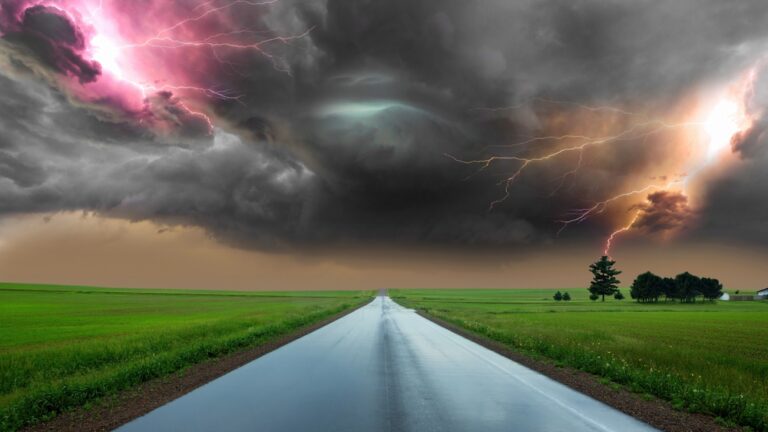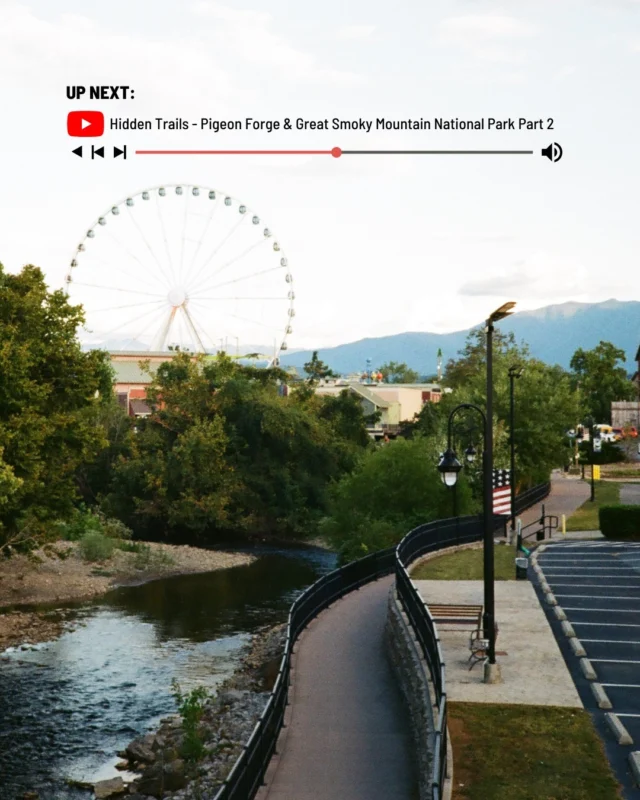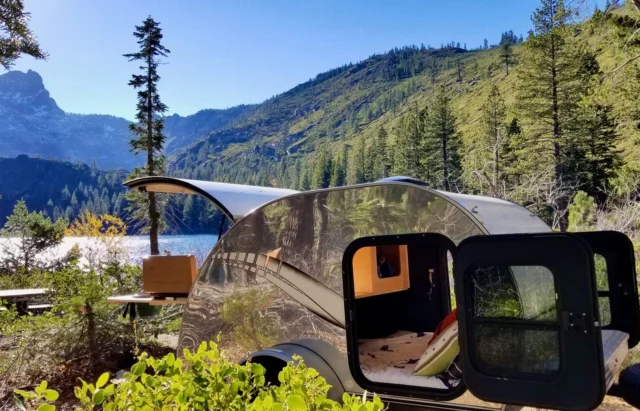
When you’re living in a sturdy home on a foundation, weather is little more than a minor inconvenience — or a source of pleasure if it’s sunny and warm.
But when you’re traveling by RV, the weather takes on a whole new level of importance. Motorhomes and travel trailers aren’t safe places to take shelter during extreme weather events, which means it’s critical to stay up-to-date and alert about changing weather patterns and potentially severe weather warnings in your area.
It’s not melodramatic to say that your life, and the lives of your family, could hang in the balance.
Fortunately, the same feature that makes RVs an unsafe place to weather a storm makes it relatively easy to avoid bad weather in the first place: they’re on wheels!
Obviously, the very best course of action you can take is to avoid camping in places that frequently experience inclement weather extremes. Even without safety concerns, that’s not too surprising or difficult. Who wants to camp in an extreme climate anyway?
But Mother Nature has a way of reorganizing even the best-laid plans. Sometimes, you can’t avoid freak weather changes and sudden storms.
So here’s what you need to know to keep you and your family safe when you’re camped in our RV during severe weather.
Causes of Weather Change
Let’s start with a little bit of severe weather 101. What causes sudden severe weather and unexpected storms?
Of course, to fully understand the way the atmosphere works, you’d need a meteorology degree. And besides, our main concern here is staying safe.
But suffice to say that most weather changes are caused by atmospheric pressure, which can change due to a variety of factors including temperature and humidity.
Storms happen when warm and cool air meet, causing an instability in the atmosphere. There are many different types of extreme weather, including the following examples:
- Thunderstorms
- Tornados
- Waterspouts
- Blizzards
- Hurricanes
Even wildfires are considered a type of severe weather.
Extreme Weather Conditions
Regardless of the facts about what causes severe weather, the important thing is that these types of events can be dangerous to human life — even in a regular home. That’s why areas are routinely evacuated if a large tropical storm or hurricane is set to hit them. Flash flooding and electrical outages can cause injuries, or even be fatal.
But in an RV, the situation’s even worse. Extremely high winds could topple your rig or blow off your awning. Flooding could easily carry the vehicle away uncontrollably.
In short, you don’t want to be in your motorhome or trailer during a serious storm, no matter what. So how can you avoid that scenario, and what preparations should you make to ensure your family stays as safe as possible?
Severe Weather
Here are some simple steps to take to combat severe weather when you’re camping in an RV.
Plan around the weather.
Obviously, you don’t want to plan a camping trip to south Florida during hurricane season. Choosing destinations that are warm, sunny, and stable at the time of your trip is the easiest and most obvious way to avoid having to deal with extreme weather events.
Always pay attention to extreme weather warnings.
Even if your destination is normally temperate during the season you’re there, you still want to keep an eye on the live weather report and forecast information to make sure you’re aware of any sudden changes.
And if reports do show a severe weather warning, take it seriously! This is no time to assume the meteorologist is probably wrong
Be aware of your location and surroundings.
In the event of an emergency, you’ll want to be able to report the address of your location to authorities. And keep in mind that many weather advisories go by county, so it’s a good idea to keep track of which county you’re in — not something we always think about while we’re camping.
Finally, choose campsites with an eye toward potential hazards if a sudden storm were to sneak up on you. Trees with low-hanging branches, nearby bodies of water, and other natural or manmade objects can quickly become dangerous in an extreme weather situation.
Download free weather apps, like live radars, that can help you stay in the know.
There are tons of weather apps on every smartphone’s market. Many of these can even be set up to provide audible notifications about severe weather warnings, which could help keep you safe in the event of a major storm.
Keep your emergency kit well stocked — and don’t forget flashlights, batteries, and backup cell phone charging banks!
You never drive off without your emergency kit, right? (Right?)
Make sure you’ve got first aid, extra food, and water on board at all times, just in case. And don’t underestimate the importance of a cell phone charging bank. Staying connected is essential to staying safe in today’s age… don’t let a lack of power take away your means of communication!
Double-check your insurance coverage.
Your RV’s insurance may or may not cover storm-related damages. Check ahead of time to see what’s covered, and negotiate with the company for more coverage if you need it.
Don’t be afraid to abandon your RV if you have to.
Even though your rig and possessions are expensive, they’re replaceable… but your life, and your family’s lives, are not.
In the event that you’re stuck in an extreme weather area, always seek shelter outside of your RV if directed to do so. Concrete bathhouses are common in campgrounds, and may be a good option for a sturdy building to hunker down in.
Extended Weather Forecast
Although thinking about camping in extreme weather conditions is scary, fortunately, most of us will never have to deal with camping in a storm… so long as we plan well and make sure we’re setting our itineraries with one eye on the weather.
Finally, check the extended forecast so you can prepare to pick up and move on well enough ahead of time to avoid storms brewing on the horizon. You’ll stay safer, of course — and also enjoy more outdoor time at your destination!






